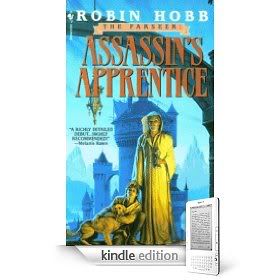Assassin's Apprentice
This review refers to the whole series: Robin Hobb's Farseer trilogy is very different from any other fantasy book you've ever read. The main difference is that it's not action-packed or even action-based. Oh, there's a lot of royal-court plotting and murder, there are battles and journies to distant lands, there is magic and magical creatures and all the other stuff you've learned to expect in a fantasy work - but somehow it's not the main thing, as is evident from the relatively slow-pacing of the plot. So if you're looking for a Robert Jordan kind of action-thriller - you better move on. But if you're an adult (emotionally, that is) and looking for something more substantial and profound - you've found the right book. The Farseer trilogy, as I have already said, is not action-based. Instead, it is charcter-based and relationship-based. it is concerned with the process of a young boy's maturing and becoming a man and an adult (in an environment which is mostly hostile) more than it is concerned with the machinations of a royal court, or the hero's training as a royal assasin. It depicts in great accuracy and detail the relationships between the hero and those around him - various father-figures, the women in his life, his enemies, and the animals he becomes magically attached to. In a sense, it is the most "realistic" fantasy novel i've ever read - not because the world described in the books is realistic, but because the relationships described seem "real": Hobb employs real feelings and gives them psychological depth, her heroes experience real love and real hate, which are often hard' complicated, ambiguous, and have moral aspects that make them even harder. Not the adolescent clear-cut love/hate we've learned to expect from fantasy heroes. Hobbs heroes experience a wide range of emotions, complete with disappointment, disillusionment and acceptance - a vital part of growing up. In that sense, Hobb's books belong to the literary tradition and genre of the Bildungsroman (a novel of formation, initiation, self-development, of training and education), of which Dickens' "Great Expectations" is a prominent example (and indeed, while reading the farseer trilogy, you can sense the influence of Dickens on Hobb's themes, mood, and character development - the disillusionment and acceptance element in particular).This genre is described in some cases as "an apprenticeship to life" (Assasin's Apprentice...) and "a search for meaningful existence within society". Hobb's hero, Fitz, finally finds his "meaningful existence" within his society and social order by making a great sacrifice (for his loved-ones and for his king), at a great cost to himself - thats what we all do when we grow up, don't we? that's another aspect of Hobb's realism - despite the final victory of the "good" in the novel, it is a bitter victory, not the superficial happy-end we know from other books. the fact that the novel is relationship-based is also reflected in the original magic-systems brilliantly devised by Hobbs for the Farseer world. It's not the kind of magic that gives you the ability to bring down lightning or throw a fire ball. it is a communication-based magic system, based on feeling, empathy and a mutual bond (or hate and emotional abuse, when the bad guys use it), between humans, or between a human and an animal. It gives Hobbs an opportunity to use the magic as an amplifier of feelings - brilliant. I've read a few of the reviews by other readers and I agree that the trilogy's end is a bit disappointing - elements of the plot are wrapped up hastily and without a satisfactory explanation. A lot of story elements are left in the dark. but the weak points of the ending concern the fantasy and plot elements of the story - which, as i already said, are not the main thing in this novel.from the emotional aspect, i think the ending is still very powerful and moving. In short, the farseer trilogy is a fantasy novel for adults. If you're ready to commit, to experience real emotions (good and bad), you're in for a treat. Robin Hobb's books stand out among modern fantasy works - they are among the few which can be considered real literary efforts, not just adventure books for kids.
Labels: Assassin's Apprentice, best-seller, fantasy, new books


